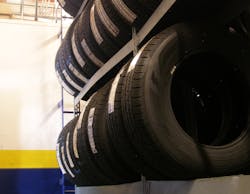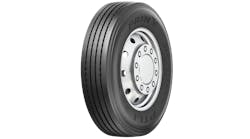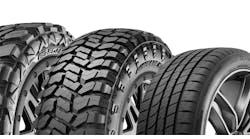The wave of North American tire plant shutdowns due to the COVID-19 crisis has been the biggest manufacturing-related development to hit the tire industry in many years. MTD recently caught up with Anne Forristall Luke, president and CEO of the U.S. Tire Manufacturers Association, to get the association’s take on how production suspensions could affect tire shipments for the remainder of 2020 and several other topics.
MTD: How will the recent tire production suspensions that have been enacted by various USTMA members impact tire shipments for the rest of the year?
Forristall Luke: Like all manufacturing industries, tire manufacturers are feeling the sudden, severe global economic downturn. However, the magnitude is unknown at this stage and will depend on the length of the pandemic, among other factors, including changing OE demand related to closure of their factories and the lack of car sales, lower demand in the replacement market and the impact of the federal government’s economic relief packages on the domestic economy and the timing of our nation’s recovery. In response to the global pandemic, several of our member companies have taken appropriate and necessary actions to protect their workers and the public, as well as respond to a decrease in market demand, by temporarily ceasing tire production.
During this time, many USTMA member tire distribution centers, warehouses, tire service centers and commercial truck centers are fully stocked, open and continue to service customers. Some USTMA members have reported their overseas plants will support U.S. market needs with no anticipated changes in supply availability or operations during the temporary U.S. shutdowns.
MTD: Are USTMA members keeping the association informed as they manage through shutdowns and other manufacturing-related decisions?
Forristall Luke: Yes, our members are keeping USTMA informed as new company decisions are made that impact the tire industry during the pandemic. Additionally, USTMA and its members closely collaborated on advocating that tire and vehicle service be designated an essential service by governments to allow continuity of service during stay-at-home orders and other government restrictions. USTMA also advocated for our members’ interests for the CARES Act with congressional leadership, and with state and local leaders, for the essential services designation and will continue our advocacy in future coronavirus stimulus packages on their behalf.
MTD: Why was passage of the CARES Act important to USTMA members and what provisions in it are of particular relevance?
Forristall Luke: Our members’ businesses support more than a quarter-million U.S. jobs, and their products make mobility possible and keep the U.S. economy moving. As such, the CARES Act is a critical first step in providing a much-needed financial boost to American workers, American businesses and to our nation’s struggling economy. Ensuring not just the physical health, but the financial well-being of the nearly 100,000 dedicated individuals working to manufacture tires in the U.S. is of paramount concern to our member companies.
USTMA and its members applaud President Trump and Congress for their leadership in moving with unprecedented speed to enact the largest economic relief package in U.S. history. The CARES Act included specific issues that USTMA identified as critical to our employees and businesses, including prioritizing a refundable employee-retention tax credit and the deferment of employer-paid payroll taxes. These provisions will help tire manufacturers retain their talented workforces and maintain critical cash flow to ensure their businesses are positioned to endure the current challenges posed by COVID-19 and a pause in economic activity.
MTD: USTMA recently emphasized the importance of ensuring that cross-border trade in North America not be impacted by COVID-19- related government restrictions. Why is this important to USTMA members and ultimately, their tire dealer customers?
Forristall Luke: Many U.S. tire manufacturers depend on frequent shipments among facilities across the continent to support manufacturing operations, as well as retail, wholesale and distribution logistics. Any disruption to those supply chains could have a crippling impact. Our member companies play an integral role in ensuring safe and reliable transportation, particularly in emergencies.
“Government vehicle fleets (local, state, and federal) and other essential personnel (doctors, nurses, healthcare providers, grocers etc.) depend on safe and reliable mobility,” she says. “Tire shops, motor vehicle supply and repair facilities are among the essential businesses that require a reliable supply of tires to keep essential vehicles on the road.



